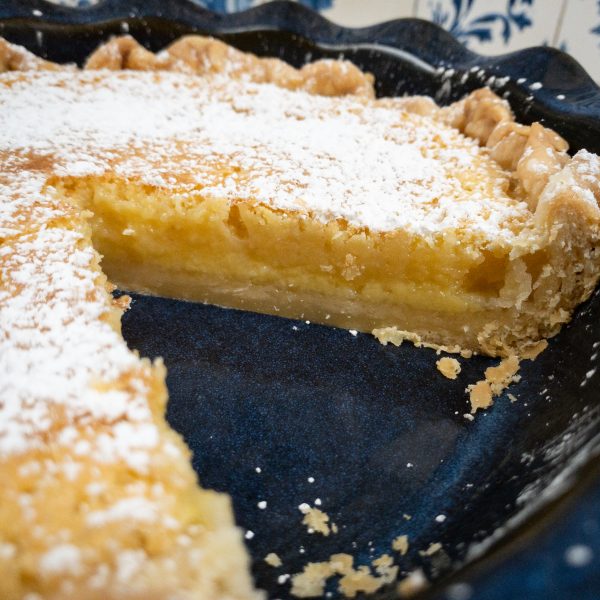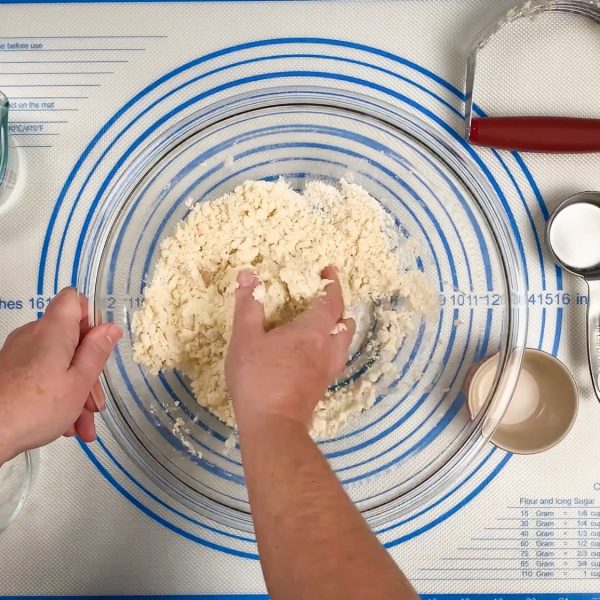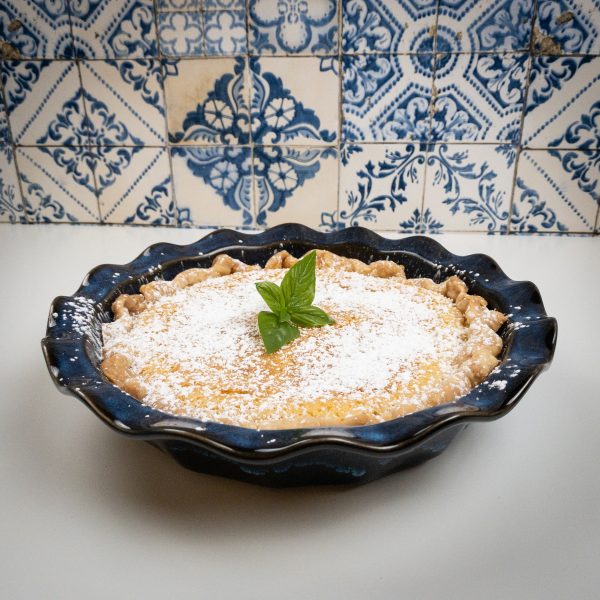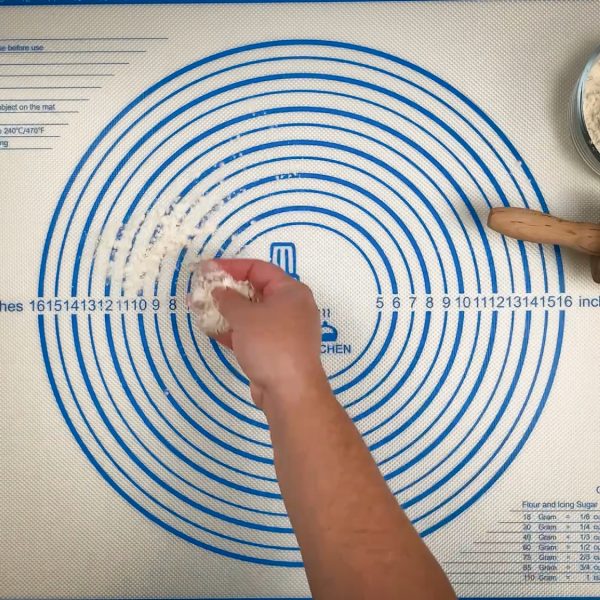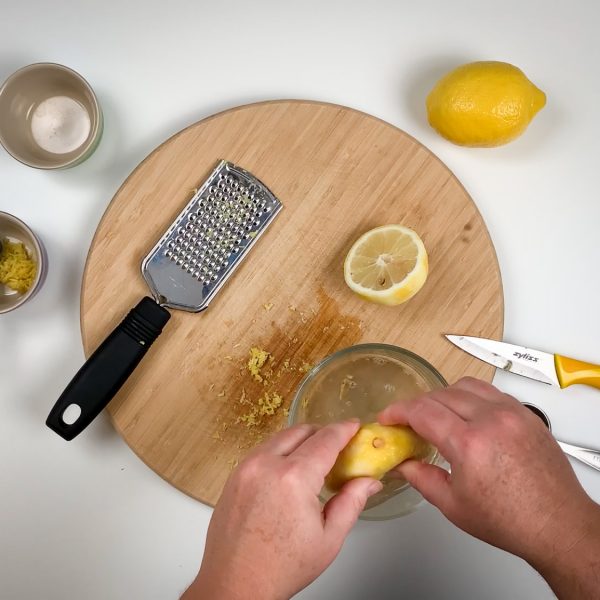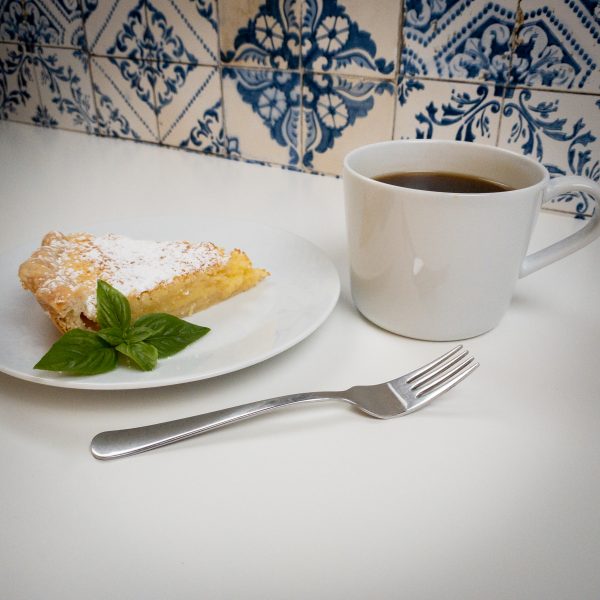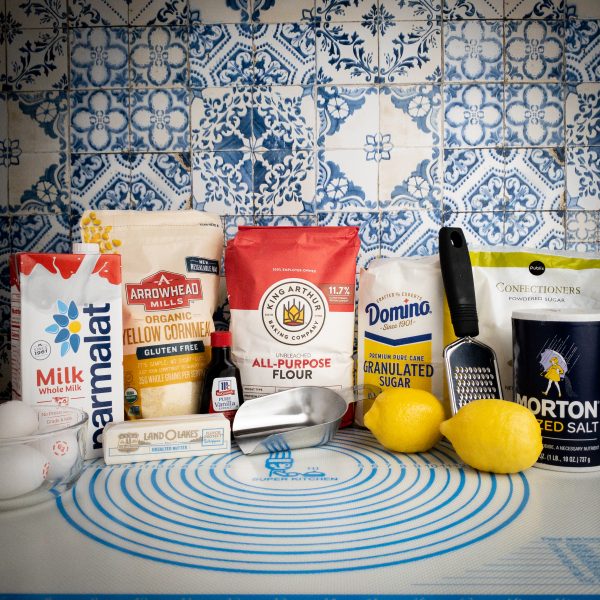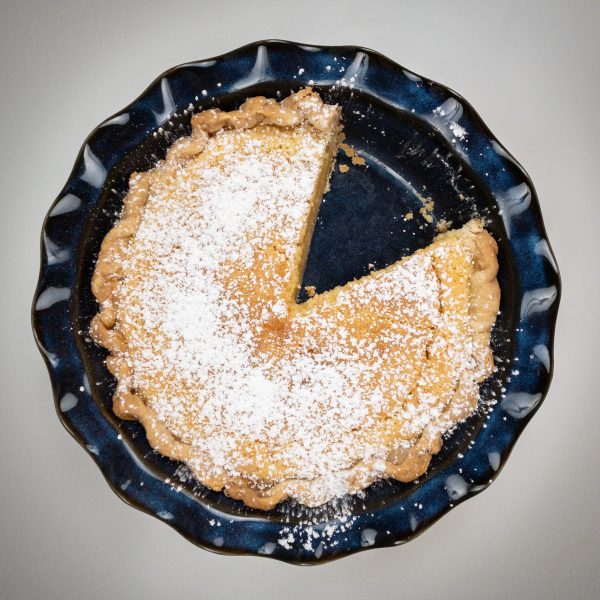The Perfect Chess Pie Recipe
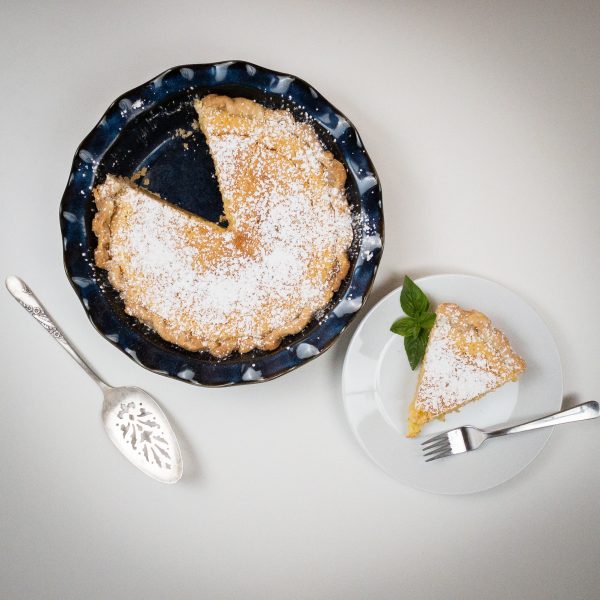
When it comes to homemade pies, the first thing that comes to mind for most people is a perception that pies have to be difficult to make. While that is true in some cases, chess pie embodies the present-day meaning of “as easy as pie.” Though originally coined to describe someone who was kind to others, this saying has taken on the same meaning as “a piece of cake.” All of this to say, the ease with which the perfect chess pie can be made will surprise you.
WHY IS IT CALLED CHESS PIE?
Like many of you, I like to know why foods have a particular name. Unfortunately, nailing down the exact origin of why we call this pie “chess pie” is easier said than done. When I sat down to research it, I quickly found myself collecting theories from various oral histories.
One possible origin is that chess pie was originally made using chestnut meal, which back in the day was used in place of cornmeal. This kinda makes sense considering “chess” and “chesnut” sound a lot alike.
Then again, others hold to the tradition that chess pie is based on cheesecake. In Martha Washington’s cookbook, she offers a recipe that’s described as “how to make cheesecake without cheese curd.” However, in her case, she didn’t give the actual pie a name.
Prior to the development and popularization of refrigeration, pies were stored in pie safes, also known as pie chests. You’ve probably come across these at your grandmother’s home or in antique shops. Being so easy to make, chess pies were frequently made and became associated with what people expected to be in a pie chest. Eventually, the name “chest pie” shifted to “chess pie.”
Probably the most popular origin story comes from the end of the 19th century in Alabama. In this version, a freed slave made a living selling pies with whatever supplies were available. Nuts and citrus were hard to come by, so she made a simple pie using sugar, eggs, vinegar, cornmeal and butter. When asked what kind of pie she was selling, she is said to have replied, “Oh, it’s jus pie,” which sounds a lot like “chess pie.”
That last one is my favorite, though I suspect there’s a wee bit of truth in each version that’s out there.
PERFECT CHESS PIE CRUST
Now, part of the beauty of chess pie is that it can be made quickly with ingredients that you most likely already have in your house. It’s the kind of pie you can put together with little effort, so many people choose to use a premade pie crust from the freezer section at their local supermarket.
For me personally, I find pleasure in slowing life down to enjoy baking. In this way, the process of making the pie is almost as wonderful as the pie itself. I also enjoy a good crust. I mean, if I’m going to have the extra calories, it mine as well be worth it, right?
For these reasons, I’ve included a fantastic homemade pie crust recipe that I got from King Arthur Baking Company. I’ve been using this recipe for over ten years and dare not deviate to another. It’s that good, I tell ya!
DEEP DISH VS REGULAR PIE PLATES
If you’ve shopped around for pie plates recently, you probably noticed that most of the pie plates out there are deep-dish nowadays. Knowing this, I deliberately set out to make this recipe using a deep-dish pie plate, thinking many of you are probably looking for recipes that are suitable yourselves. My mint chocolate pudding pie would also work well in a deep-dish pie plate. I went with a 9-inch Koov ceramic pie plate for this perfect chess pie recipe and was extremely happy with my purchase. In fact, I’m now eager to try their casserole dishes as well.
PASTRY MAT VS NO PASTRY MAT
Another item I picked up for this project was a 20” x 28” silicone pastry mat. In the past, I’ve always used a countertop for rolling out my dough, which works great. The downside is the cleanup, so I wanted to give a pastry mat a shot to see if it helped. What I found was that I was able to use a lot less flour to keep my dough from sticking. It made for a super easy cleanup, which anyone would appreciate. I also liked that I was able to measure the size of my dough more easily.
LEMON JUICE VS VINEGAR
In comparing chess pie recipes, you’ll see that they either call for vinegar or lemon juice. I’m a fan of lemon, so I went with the lemon juice. One recipe I encountered called for ¼ cup of lemon juice. I like to keep the amount of liquid down in pies and casseroles, as I don’t want soup, so I opted to reduce the lemon juice to two tablespoons and add in two teaspoons of lemon zest instead. The results were phenomenal!
PAIRINGS FOR THE PERFECT CHESS PIE
Chess pie is loaded with sugar, so a medium to full-bodied coffee will balance out the sweetness. English breakfast tea is another great choice. I’d definitely stay away from coffee with sugar and milk or sweet tea, as the sweetness in these will compete for the attention of your taste buds.
INGREDIENTS FOR CHESS PIE
PIE CRUST
- 1 ¼ cup of all-purpose flour
- ½ teaspoon salt
- 8 tablespoons unsalted butter – cut into pats
- ¼ cup ice water
PIE FILLING
- 2 cups white sugar
- 2 tablespoons cornmeal
- 2 tablespoons all-purpose flour
- 4 eggs
- ⅔ cup whole milk
- ½ cup melted butter
- 2 tablespoons freshly squeezed lemon juice (can substitute 1 tablespoon white distilled vinegar)
- ¼ teaspoon salt
- 1 teaspoon vanilla extract
- 2 teaspoons lemon zest (optional)
- fresh basil or mint leaves for garnish
- powdered sugar to dust the top
INSTRUCTIONS FOR CHESS PIE
PIE CRUST
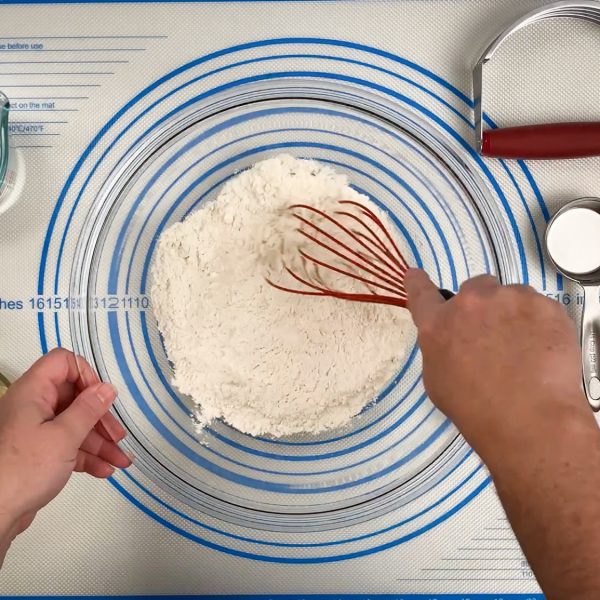
STEP 1: COMBINE THE DRY INGREDIENTS
Whisk together 1 1/4 cups all-purpose flour & 1/2 teaspoon salt. Add in 8 tablespoons unsalted butter.
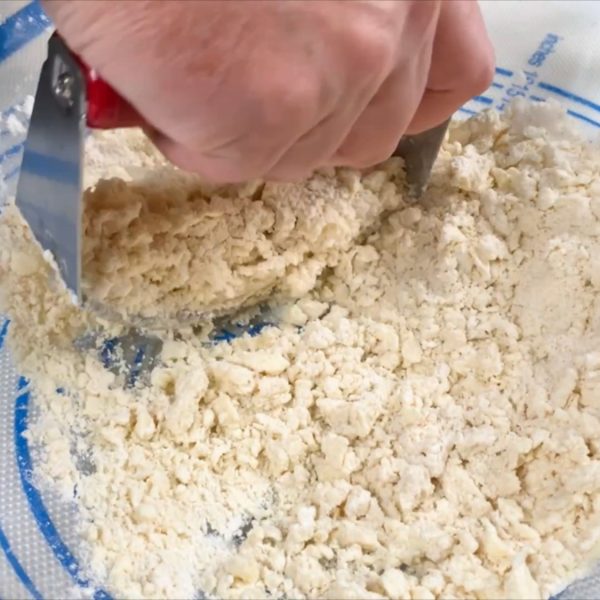
STEP 2: WORK THE BUTTER INTO THE FLOUR
Next, work the butter into the flour until it is well-distributed.
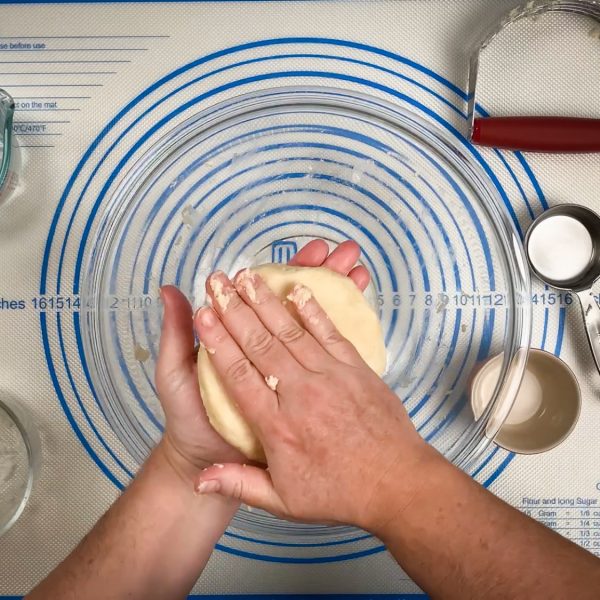
STEP 3: FORM THE DOUGH INTO A DISK
Add a few splashes of ice water. Toss the dough around until it holds together without crumbling. If the dough breaks easily or feels dry in places, add a little more water. Gather the dough into a ball and form it into a disk. Chill the dough for 30 minutes before rolling. If more than 30 minutes, you’ll want to allow the dough 10-15 minutes to return to room temperature. It should roll pretty easily.
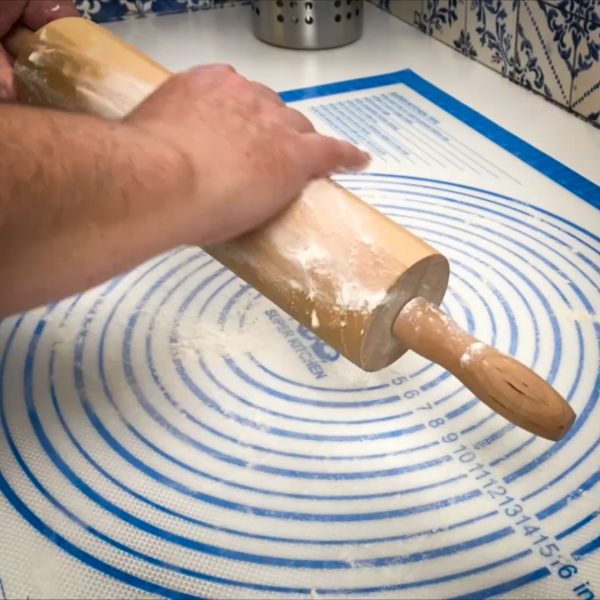
STEP 4: PREPARE THE SURFACE FOR ROLLING
Sprinkle flour on your rolling surface to prevent sticking. Coat your rolling pin & dough with flour as well.
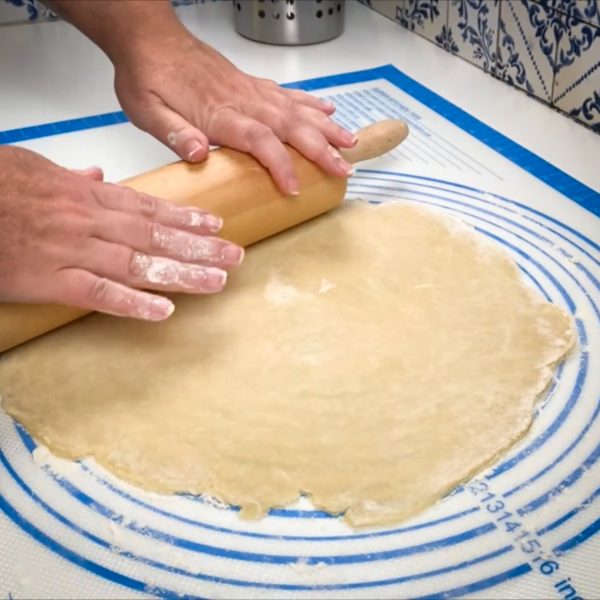
STEP 5: ROLL OUT THE DOUGH
Roll out your dough until it reaches the desired size. For a 9-inch deep-dish pie plate, you’ll want 12-13 inches of dough.
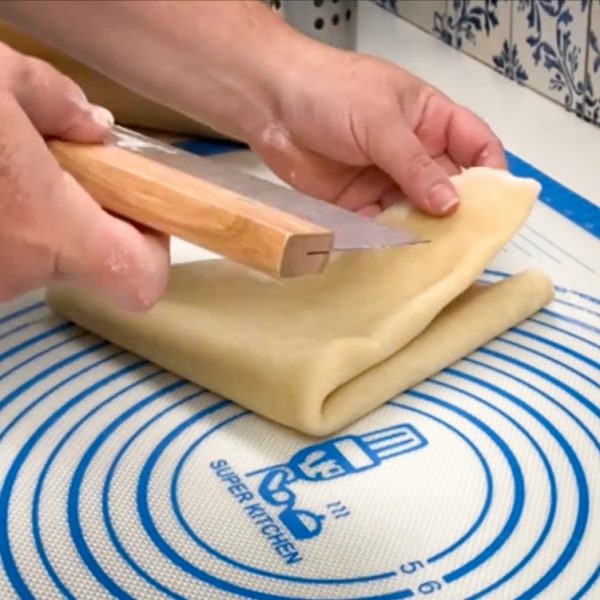
STEP 6: TRANSFER THE DOUGH
Fold the dough into a triangle. Then, unfold the dough in your pie plate.
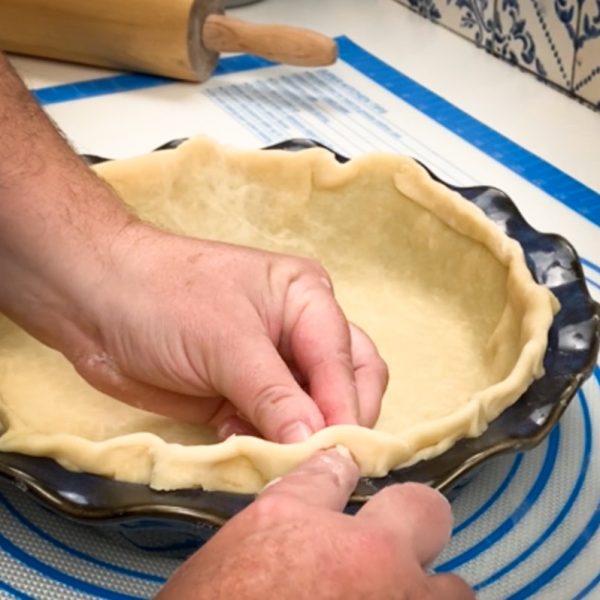
STEP 7: MAKE THE EDGES BEAUTIFUL
Trim the edges to remove excess dough. Fold the edges under to form an even crust. Use your fingers to crimp the edge of the crust.
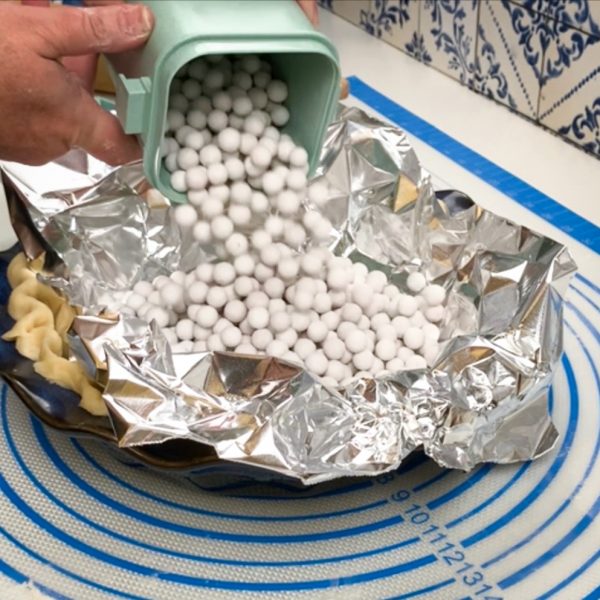
STEP 8: ADD IN PIE WEIGHTS
Line the pie crust with a piece of aluminum foil. Fill the foil with ceramic pie weights. I used FurRain ceramic pie weights. Dry beans also work as a substitute.
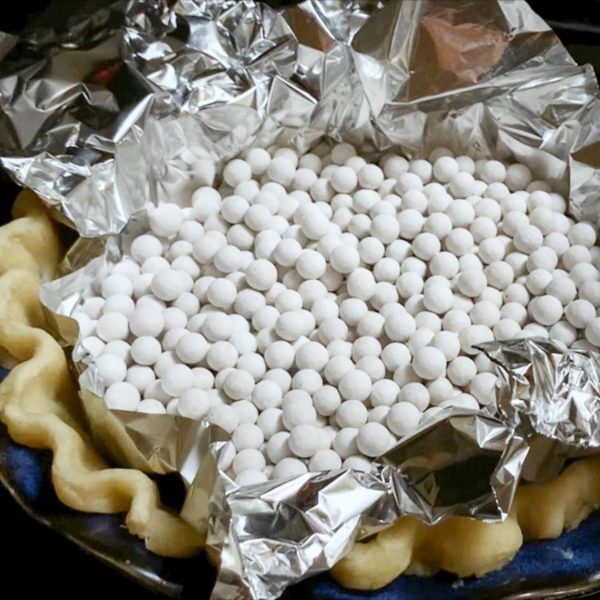
STEP 9: BAKE THE CRUST
Bake the crust at 425°F for 4-5 minutes. Remove weights. Bake for 2 more minutes. Note: If you overcook the crust it will rise in the middle.
PERFECT CHESS PIE FILLING
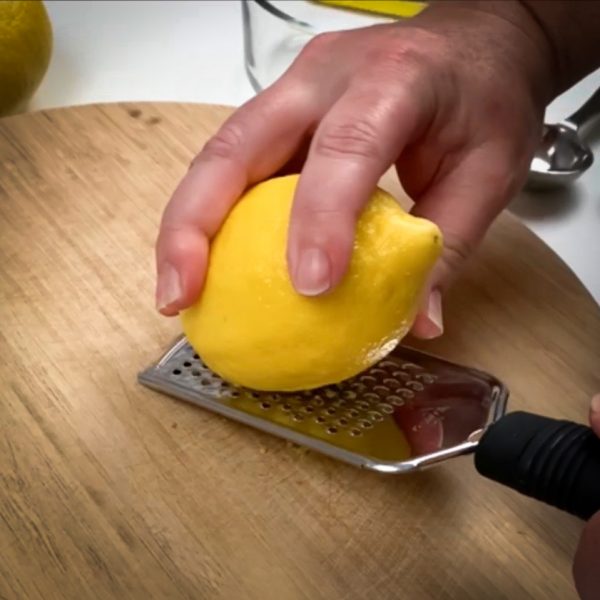
STEP 1: PREPARE THE LEMONS
Zest 2 teaspoons of lemon peel. Squeeze 2 tablespoons of juice from the lemons.
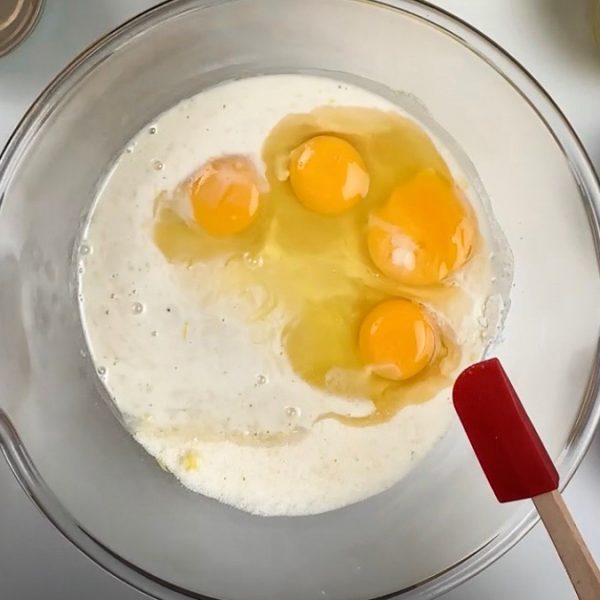
STEP 2: COMBINE THE INGREDIENTS
Combine 2 cups sugar, 2 tablespoons cornmeal, 2 tablespoons all-purpose flour, and ¼ teaspoon of salt, 1 teaspoon vanilla extract, 2 teaspoons lemon zest, 2/3 cup of whole milk, 2 tablespoons lemon juice, 4 unbeaten eggs and 1/2 cup melted butter as well. Note: Butter should be at room temperature so the eggs don’t cook prematurely.
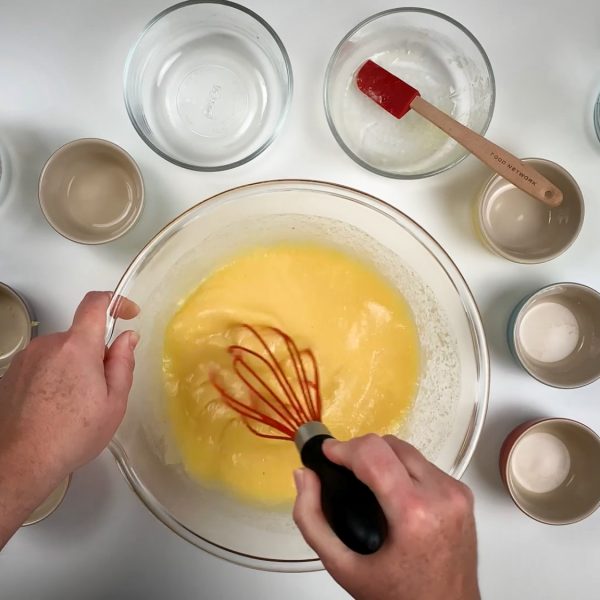
STEP 3: WHISK
Whisk everything together until fully incorporated.
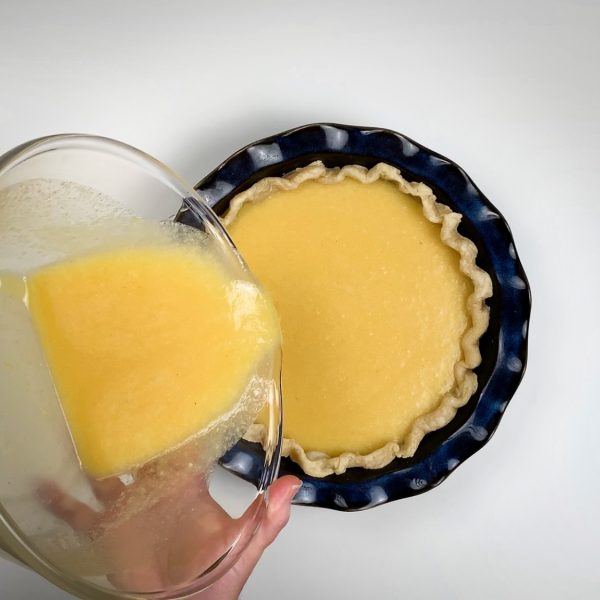
STEP 4: POUR THE FILLING
Pour the filling into the pie crust. Do not overfill!
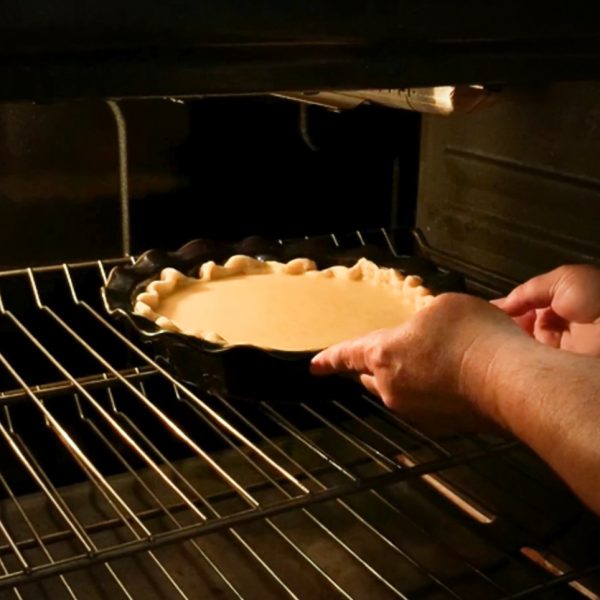
STEP 5: BAKE THE PIE
Bake at 400°F for 10 minutes. Then at 350°F for 30-35 minutes.
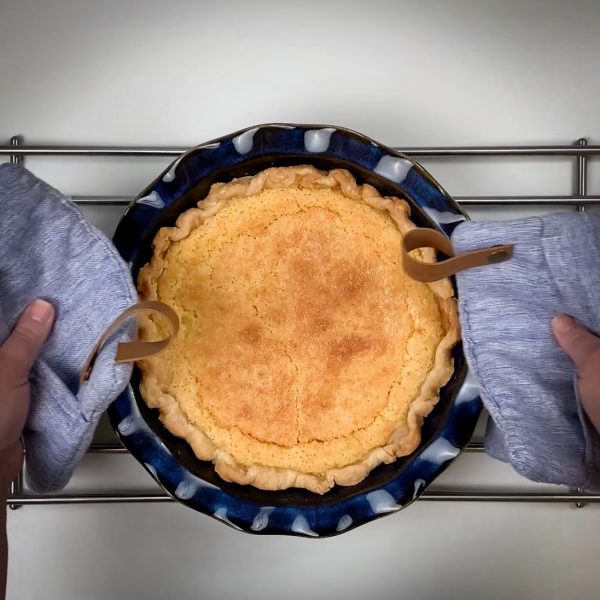
STEP 6: LET THE PIE COOL OR CHILL
Cool for 1 hour or chill overnight in the refrigerator before serving.
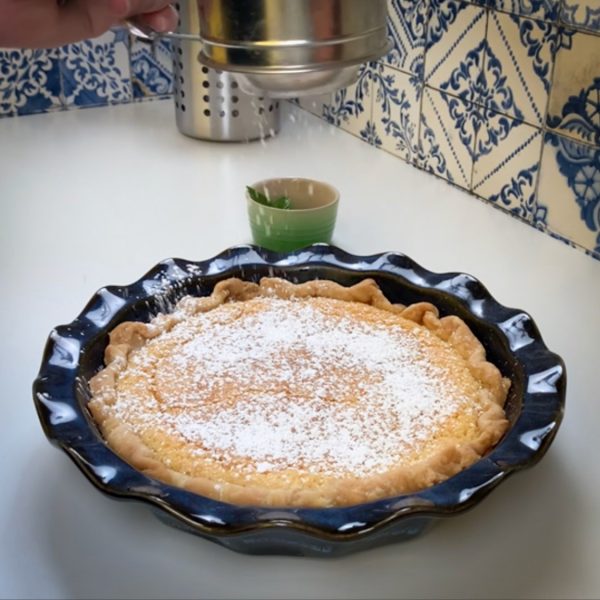
STEP 7: GARNISH
Top with powdered sugar. Garnish with fresh basil or mint.
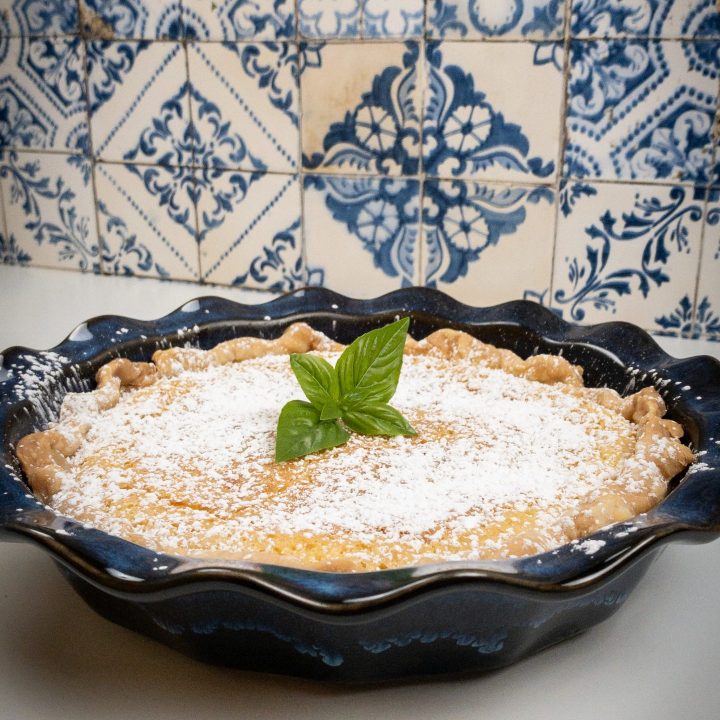
The Perfect Chess Pie Recipe
A simple, delicious pie recipe using basic ingredients nearly everyone already has at home.
Ingredients
- 1 ¼ cup of all-purpose flour
- ½ teaspoon salt
- 8 tablespoons unsalted butter – cut into pats
- ¼ cup ice water
- 2 cups white sugar
- 2 tablespoons cornmeal
- 2 tablespoons all-purpose flour
- 4 eggs
- ⅔ cup whole milk
- ½ cup melted butter
- 2 tablespoons freshly squeezed lemon juice
- ¼ teaspoon salt
- 1 teaspoon vanilla extract
- 2 teaspoons lemon zest (optional)
- fresh basil or mint leaves for garnish
- powdered sugar to dust the top
Instructions
- Whisk together 1 1/4 cups all-purpose flour & 1/2 teaspoon salt. Add in 8 tablespoons unsalted butter.
- Next, work the butter into the flour until it is well-distributed.
- Add a few splashes of ice water. Toss the dough around until it holds together without crumbling. If the dough breaks easily or feels dry in places, add a little more water. Gather the dough into a ball and form it into a disk. Chill the dough for 30 minutes before rolling. If more than 30 minutes, you’ll want to allow the dough 10-15 minutes to return to room temperature. It should roll pretty easily.
- Sprinkle flour on your rolling surface to prevent sticking. Coat your rolling pin & dough with flour as well.
- Roll out your dough until it reaches the desired size. For a 9-inch deep-dish pie plate, you’ll want 12-13 inches of dough.
- Fold the dough into a triangle. Then, unfold the dough in your pie plate.
- Trim the edges to remove excess dough. Fold the edges under to form an even crust. Use your fingers to crimp the edge of the crust.
- Line the pie crust with a piece of aluminum foil. Fill the foil with ceramic pie weights. I used FurRain ceramic pie weights. Dry beans also work as a substitute.
- Bake the crust at 425°F for 4-5 minutes. Remove weights. Bake for 2 more minutes. Note: If you overcook the crust it will rise in the middle.
- Zest 2 teaspoons of lemon peel. Squeeze 2 tablespoons of juice from the lemons.
- Combine 2 cups sugar, 2 tablespoons cornmeal, 2 tablespoons all-purpose flour, and ¼ teaspoon of salt, 1 teaspoon vanilla extract, 2 teaspoons lemon zest, 2/3 cup of whole milk, 2 tablespoons lemon juice, 4 unbeaten eggs and 1/2 cup melted butter as well. Note: Butter should be at room temperature so the eggs don’t cook prematurely.
- Whisk everything together until fully incorporated.
- Pour the filling into the pie crust. Do not overfill!
- Bake at 400°F for 10 minutes. Then at 350°F for 30-35 minutes.
- Cool for 1 hour or chill overnight in the refrigerator before serving.
- Top with powdered sugar. Garnish with fresh basil or mint.

